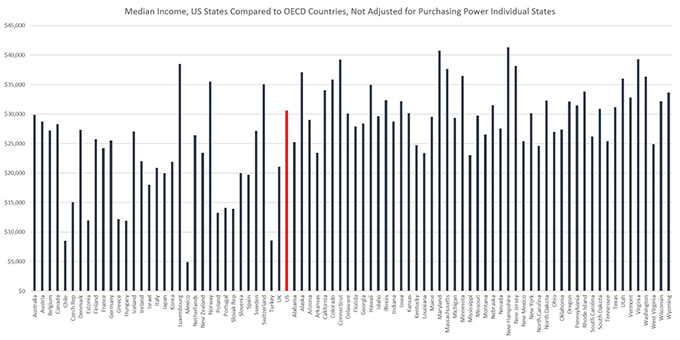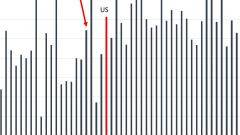If Sweden and Germany Became US States, They Would be Among the Poorest States
Source: mises.org
Worse than Mississippi?
Last year, a debate erupted over how Britain would compare to individual US states. In the UK Spectator, Fraser Nelson explained "Why Britain is poorer than any US state, other than Mississippi." A week later, TIME shot back with an article titled "No, Britain Is Not Poorer than Alabama." The author of the TIME article, Dan Stewart, explained that, yes, Britain is poorer than many US states, but certainly not all of them. (See below to confirm that the UK is, in fact, poorer than every state.)
The main fault of the Spectator article, its critics alleged, was that it relied primarily on GDP and GDP per capita to make the comparisons. The critics at TIME (and other publications) correctly pointed out that if one is going to draw broad conclusions about poverty among various countries, GDP numbers are arguably not the best metric. For one, GDP per capita can be skewed upward by a small number of ultra-rich persons. After all, it is just GDP divided by the total population. That gives us no idea of how the median household is doing is those areas. Also, it's best to avoid averages and stick with median values if we're looking to avoid numbers that can be pulled up by some wealthy outliers.
This same criticism was applied to a 2007 study by Swedish economists Fredrik Bergström and Robert Gidehag (and an article by Mark J Perry) who had asserted that according to their calculations, Sweden was poorer than most US states.
The Bergstrom and Gidehag study was no back-of-the-envelope analysis, but given that they did rely largely on GDP per capita data, I thought it might be helpful to use data that relies on median income data instead, so as to better account for inequalities in income and to get a better picture of what the median resident's purchasing power. Click for full size:

The nationwide median income for the US is in red. To the left of the red column are other OECD countries, and to the right of the red bar are individual US states. These national-level comparisons take into account taxes, and include social benefits (e.g., "welfare" and state-subsidized health care) as income. Purchasing power is adjusted to take differences in the cost of living in different countries into account.
Since Sweden is held up as a sort of promised land by American socialists, let's compare it first. We find that, if it were to join the US as a state, Sweden would be poorer than all but 12 states, with a median income of $27,167.
Median residents in states like Colorado ($35,830), Massachusetts ($37,626), Virginia ($39,291), Washington ($36,343), and Utah ($36,036) have considerably higher incomes than Sweden.
With the exception of Luxembourg ($38,502), Norway ($35,528), and Switzerland ($35,083), all countries shown would fail to rank as high-income states were they to become part of the United States. In fact, most would fare worse than Mississippi, the poorest state.
For example, Mississippi has a higher median income ($23,017) than 18 countries measured here. The Czech Republic, Estonia, Greece, Hungary, Ireland, Italy, Japan, Korea, Poland, Portugal, Slovenia, Spain, and the United Kingdom all have median income levels below $23,000 and are thus below every single US state. Not surprisingly, the poorest OECD members (Chile, Mexico, and Turkey) have median incomes far below Mississippi.
Germany, Europe's economic powerhouse, has a median income ($25,528) level below all but 9 US states. Finland ranks with Germany in this regard ($25,730), and France's median income ($24,233) is lower than both Germany and Finland. Denmark fares better and has a median income ($27,304) below all but 13 US states.
On the other hand, were Australia ($29,875), Austria ($28,735), and Canada (28,288) to join the US, they would be regarded as "middle-income states" with incomes similar to the US median of $30,616.
...
Read the rest: mises.org






















